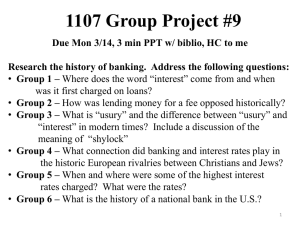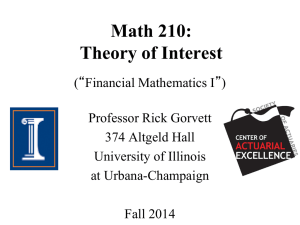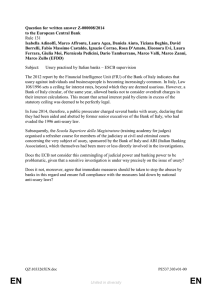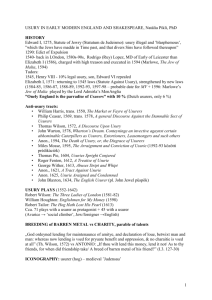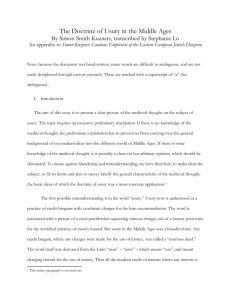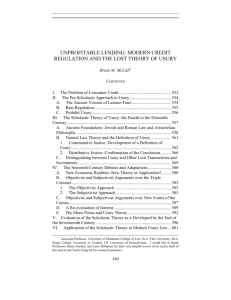Barry Marks Handout
advertisement
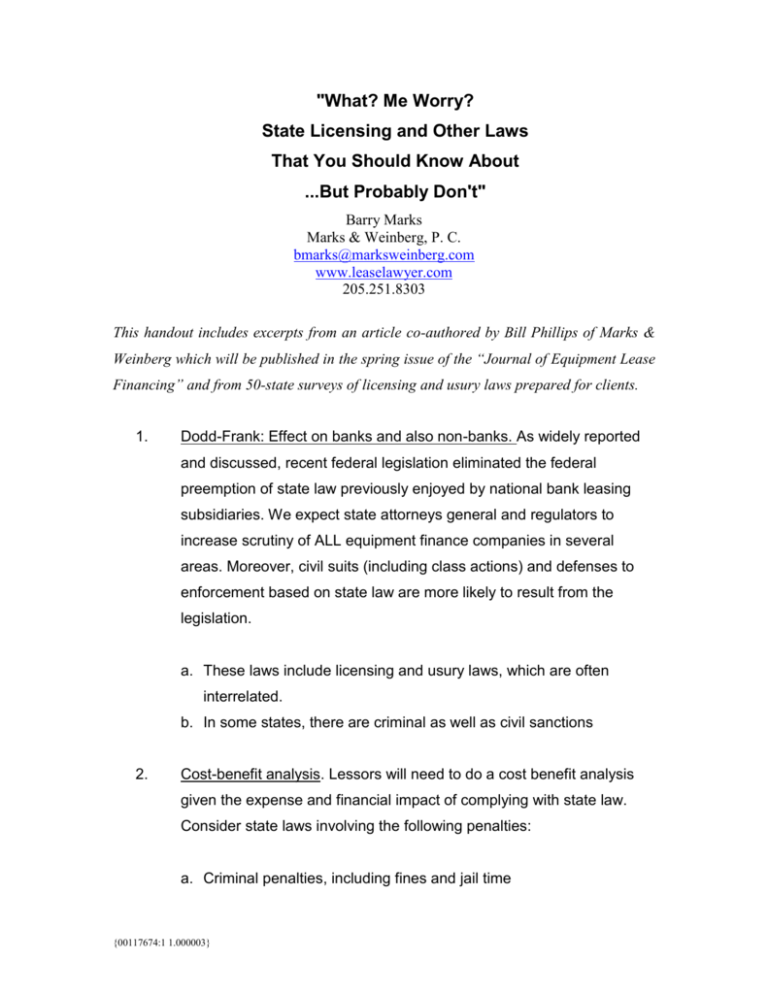
"What? Me Worry?
State Licensing and Other Laws
That You Should Know About
...But Probably Don't"
Barry Marks
Marks & Weinberg, P. C.
bmarks@marksweinberg.com
www.leaselawyer.com
205.251.8303
This handout includes excerpts from an article co-authored by Bill Phillips of Marks &
Weinberg which will be published in the spring issue of the “Journal of Equipment Lease
Financing” and from 50-state surveys of licensing and usury laws prepared for clients.
1.
Dodd-Frank: Effect on banks and also non-banks. As widely reported
and discussed, recent federal legislation eliminated the federal
preemption of state law previously enjoyed by national bank leasing
subsidiaries. We expect state attorneys general and regulators to
increase scrutiny of ALL equipment finance companies in several
areas. Moreover, civil suits (including class actions) and defenses to
enforcement based on state law are more likely to result from the
legislation.
a. These laws include licensing and usury laws, which are often
interrelated.
b. In some states, there are criminal as well as civil sanctions
2.
Cost-benefit analysis. Lessors will need to do a cost benefit analysis
given the expense and financial impact of complying with state law.
Consider state laws involving the following penalties:
a. Criminal penalties, including fines and jail time
{00117674:1 1.000003}
b. Forfeiture of entire loan
c. Forfeiture of interest only
d. Damages, including multiples of overcharges
e. Increased scrutiny – once you are identified as failing to have your
license, what else will the state want to know about?
3.
Licensing and usury variables:
a. Consumer v. Business
i. Be sure it’s clear
ii. Small deals may be treated as consumer regardless of the
use of the equipment – see below
b. Criminal v. Civil
i. Criminal Usury – Colorado, Florida
ii. Other penalties
c. Choice of Law
i. Legitimacy of selection – what is the relationship to the
selected state?
ii. Policy/ Restatement of Conflicts of Law – A judge does not
have to recognize your choice of law
1. Washington state case
2. Does it ever affect criminal liability?
a. Evidence of criminal intent?
b. Legitimacy of selection ?
iii. Forum Selection makes choice stronger
d. Usury Savings Clause
i. Does it have any effect on licensing?
ii. Is it evidence of bad intent?
iii. Are you willing to forego interest?
iv. Wording?
e. Equipment Type
i. Motor Vehicles – ELFA
{00117674:1 1.000003}
1. Leases and loans are often both covered
2. Anti-curbstoning laws (Miss, La.) – requires a place of
business in the state.
3. Interest rate may be affected and relevant
ii. Licensing for disposal or operation of certain equipment,
such as computers and hazardous waste-producing items
and medical equipment
f. Size of Transaction
i. Considered consumer – Florida ($25,000)
ii. License required – DC ($25,000)
iii. Generally, $35,000 safe, below that…?
g. Type of Transaction
i. Leases generally do not have “interest”
1. But beware fees (in loans, too)
2. Security deposits
3. Commitment fees, etc.
4. Lease intended as security?
ii. Retail Installment Sales – vendor programs carry both
licensing and usury implications
1. “Purchase” or originating?
2. Private Label?
3. What about financing leases?
h. Time/Price Differential
i. Tennessee
ii. Does including this language make the transaction a retail
sale for other legal purposes such as licensing and defense
to hell or high water?
{00117674:1 1.000003}
Selected State Laws of Note:
1.
CONNECTICUT
Motor Vehicle Leases: Conn. Gen. Stat. § 14-15(a) provides “Any person, firm or
corporation before engaging in the business of leasing or renting motor vehicles without
drivers in this state and any person, firm or corporation which is the lessor of or rents any
vehicle required to be registered under the provisions of section 14-15a shall make a
sworn application to the Commissioner of Motor Vehicles for a license to engage in such
leasing or renting.”
Installment Sale Contracts: The state requires a license to operate as a “sales finance
company” Conn. Gen. Stat. § 36a-536 Under Conn. Gen. Stat. § 36a-535(2) a sales
finance company is “any person engaging in this state in the business, in whole or in part,
of acquiring retail installment contracts from retail sellers, or installment loan contracts
from the holders thereof, by purchase, discount or pledge, or by loan or advance to the
holder of either on the security thereof, or otherwise, but does not include a bank, out-ofstate bank, Connecticut credit union, federal credit union, or out-of-state credit union, if
so engaged.”
2.
FLORIDA
Loans: The definition of a “consumer finance loan” in Florida includes any loan for an
amount less than $25,000 at a rate of interest greater than 18% per year. Fla. Stat. §
516.01(2). An entity may not make such loans without a license. Id. § 516.02(1). There
are no licensing requirements for commercial lenders making commercial loans in
amounts exceeding $25,000. The Florida licensing authority is the Office of Financial
Regulation. We contacted the OFR office and the representative confirmed that the
licensing requirements for “consumer finance loans” applies to all loans under $25,000
including commercial loans. Violation of this licensing statute is a misdemeanor in the
first degree punishable by up to one year in prison and a fine of $1,000. Fla. Stat. §§
516.19, 775.082, 775.083
{00117674:1 1.000003}
Installment Sale Contracts: In order to originate or purchase installment sale contracts
in Florida a lender must a Sales Finance Company license. Fla. Stat. § 520.52(1) provides
“[a] person may not engage in the business of a sales finance company or operate a
branch of such business without a license as provided in this section; however, a bank,
trust company, savings and loan association, or credit union authorized to do business in
this state is not required to obtain a license under this part.” A sales finance company is
defined as “a person engaged in the business of purchasing retail installment contracts
from one or more sellers. The term includes, but is not limited to, a bank or trust
company, if so engaged. The term does not include the pledge of an aggregate number of
such contracts to secure a bona fide loan thereon.” Fla. Stat. § 520.02 Any person who
engages in the business of a sales finance company without obtaining a license is guilty
of a misdemeanor of the first degree, punishable by up to one year in prison and a fine of
$1,000. Fla. Stat. § 520.57, 775.082, 775.083
See: http://www.flofr.com/finance/licensing-g.htm
Usury: In general, the maximum rate of interest is 18% simple interest. Fla. Stat. §§
687.02 & 687.03(1). If the loan is for an amount in excess of $500,000, the maximum
rate of interest is 25%. Any person charging an interest rate exceeding 25% is guilty of
usury misdemeanor and exceeding 45%, usury felony). Id. §§ 687.02(1), 687.03(1),
687.071(2), 687.071(3).
3.
NEVADA
Loans: Nev. Rev. Stat. § 675.060(1) states that “[n]o person may engage in the business
of lending in this state without first having obtained a license from the commissioner for
each office or other place of business at which the person engages in such business.” A
person is considered to be engaging in business within the state if he “[s]olicits loans in
this state or makes loans to persons in this state.” Id. 675.060 (2)(a). The statue includes
the following in its explanation of “engaging in the business of lending in this State”:
solicits loans in this State or makes loans to persons in this State, unless there are
isolated, incidental or occasional transactions.” NRS 675.040 provides for exemptions to
{00117674:1 1.000003}
the provisions of that chapter of the statues including banks.1 It does not specifically
exempt subsidiaries of banks. “Any person and the several members, officers, directors,
agents and employees thereof who violate or participate in the violation of any provision
of NRS 675.060 are guilty of a misdemeanor.” NRS. § 675.470. This license is called the
Installment Loan Company License and is obtained from the Nevada Department of
Commerce & Industry – Financial Institutions Division.
4.
NEW YORK
Loans: If an entity charges, contracts for, or receives a greater rate of interest than the
lender would otherwise be permitted to charge under state usury law on a business
purpose loan for $50,000 or less, a lending license is required. A lending license is not
1
675.040. Applicability of chapter; exemptions.
This chapter does not apply to:
1. Except as otherwise provided in NRS 675.035, a person doing business under the authority of any
law of this State or of the United States relating to banks, national banking associations, savings banks,
trust companies, savings and loan associations, credit unions, development corporations, mortgage brokers,
mortgage bankers, thrift companies, pawnbrokers or insurance companies.
2. A real estate investment trust, as defined in 26 U.S.C. § 856.
3. An employee benefit plan, as defined in 29 U.S.C. § 1002(3), if the loan is made directly from
money in the plan by the plan's trustee.
4. An attorney at law rendering services in the performance of his or her duties as an attorney at law
if the loan is secured by real property.
5. A real estate broker rendering services in the performance of his or her duties as a real estate
broker if the loan is secured by real property.
6. Except as otherwise provided in this subsection, any firm or corporation:
(a) Whose principal purpose or activity is lending money on real property which is secured by a
mortgage;
(b) Approved by the Federal National Mortgage Association as a seller or servicer; and
(c) Approved by the Department of Housing and Urban Development and the Department of
Veterans Affairs.
7. A person who provides money for investment in loans secured by a lien on real property, on his or
her own account.
8. A seller of real property who offers credit secured by a mortgage of the property sold.
9. A person holding a nonrestricted state gaming license issued pursuant to the provisions of chapter
463 of NRS.
10. A person licensed to do business pursuant to chapter 604A of NRS with regard to those services
regulated pursuant to chapter 604A of NRS.
{00117674:1 1.000003}
required if the lender charges a rate of interest that is within the statutory maximum
amount under otherwise applicable state usury law. N.Y. Banking Law § 340. The basic
usury rate is 16% per annum although it is higher for loans in excess of $250,000.
Licensing provision is applicable to persons or entities that solicit loans in the amounts
prescribed above within New York and, in connection with such solicitation, make loans
to individuals that reside in New York.
Usury: The maximum rate of interest in New York is 16%, except where indicated
otherwise in the laws of the state. N.Y. Gen. Oblig. §5-501(1) and N.Y. Banking Law
§14-a.2 For loans for an amount exceeding $250,000, the maximum rate of interest is
25%, and a rate exceeding that amount is subject to criminal penalties. N.Y. Gen. Oblig.
Law § 5-501(6) (a) and N.Y. Penal Law §§ 190.40 and 190.42. If a loan or forbearance is
in the amount of $2,500,000 or more, there is no limitation on the maximum rate of
interest, and the criminal usury provisions of the Penal Law do not apply. N.Y. Gen.
Oblig. Law § 5-501(6) (b) and N.Y. Penal Law §§ 190.40 and 190.42.
Interest charged on loans or forbearances made to corporations for business or
commercial purposes in the amount of $100,000 or more and secured in compliance with
the UCC Article 9 is not subject to any limitations or criminal usury law, if on the date
when the interest is charged or accrued, such interest is not greater than 8 percentage
points above the prime rate. N.Y. Gen. Oblig. Law § 5-526. Corporations and limited
liability companies cannot assert a defense of usury N.Y. Gen. Oblig. Law §5-521(1) &
N.Y. Limited Liability Company Law §1104. but they may assert the defense of criminal
usury if the rate exceed the criminal usury rate. N.Y. Penal Law § 190.40.
In short: The civil usury rate is 16% but corporations and limited liability companies
cannot plead a usury defense if the rate is above 16% and below 25%. The criminal usury
rate is 25%. However, for personal property-secured loans to corporations the usury rate
is the greater of 25% or 8% above the prime rate.
2
Interest rate includes any and all amounts paid or payable, directly or indirectly, by any person, to or for
the account of the lender in consideration for the making of a loan or forbearance. Id. N.Y. Banking Law §
14a.
{00117674:1 1.000003}
New York lenders and those choosing to apply New York law should also note that under
New York law, a usurious note is void and the lender forfeits the entire loan balance.
Gen.Oblig. §5-511(1).
{00117674:1 1.000003}
BARRY S. MARKS
Marks & Weinberg, P.C.
www.leaselawyer.com
barry@leaselawyer.com
Barry S. Marks has concentrated his practice in the areas of equipment leasing and
commercial lending and finance since 1977 and is a Certified Lease Professional (CLP).
Legal Publications Author - Chapters in Matthew Bender's Equipment Leasing and the
Practicing Law Institute's Equipment Leasing - Leveraged Leasing treatises. Co-Author - Power
Tools for Successful Leasing; Technology Leasing: A Lessee Toolkit; Power Tools for
Small Ticket Leasing (all from Leasing Power Tools Press www.leasingpress.com and on
Amazon.com).
Professional Honors & Activities Listed in The Best Lawyers in America® since
2005; Best Lawyers in Alabama and Alabama Super Lawyers; Director Emeritus, National
Association of Equipment Leasing Brokers; Boards of Editors, Journal of Equipment Lease
and Financing and LJN (formerly Leader's) Equipment Leasing Newsletter; Past Member,
Legal Committee of the Equipment Leasing and Finance Association; Bill Granieri Award for
Education in Equipment Leasing (1999); Member, Alabama State Bar, The Florida Bar
and State Bar of Georgia. Certified Lease Professional (CLP).
Education Emory University, B.A., 1974, magna cum laude; University of Florida,
J.D., 1976, with high honors; Emory University, LLM. (Taxation), 1985.
Personal When he is not working, Barry finds time to write poetry and the occasional
short story. He is a past president of the Alabama State Poetry Society and was
Alabama’s Poet of the Year in 1999. Barry has published two books of poetry, Possible
Crocodiles is available at www.brickroadpoetrypress.com and Sounding, poems dealing
with grief and survival, is available at http://negativecapabilitypress.squarespace.com.
Both are on Amazon.com.
{00117674:1 1.000003}
